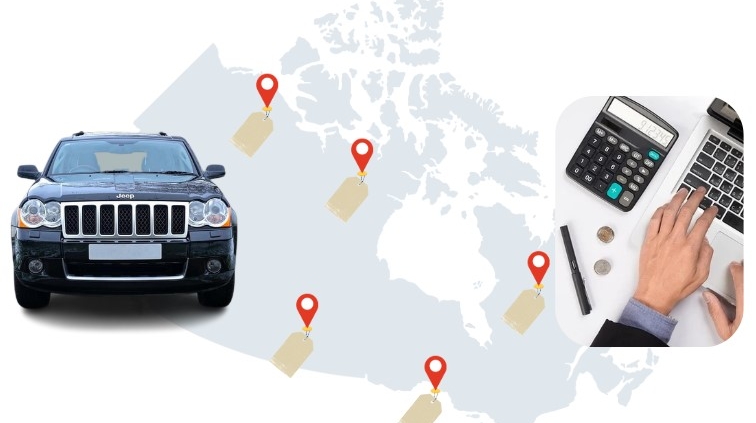Car Resale Value: Location & Other Factors at Play

Imagine two identical cars—same model, year, and mileage—but one sells for thousands more than the other. What’s the difference? Location. Where you live in Canada plays a crucial role in determining your car’s resale value, but it’s not the only factor.
Take this real-world example: A used 4×4 truck in Alberta may fetch a high price due to demand from rural and industrial buyers, while the same truck in downtown Vancouver—where compact cars and EVs are preferred—may struggle to sell. Similarly, a convertible in Ontario might sell fast in the summer, but its resale value drops during the colder months.
Beyond location, economic trends, seasonal demand, and vehicle condition also shape resale value. Understanding these factors can help you maximize what you get when selling your vehicle.
How Global Events and Market Trends Affect Resale Value
Impact of Economic Shifts
Major world events and economic trends directly impact the used car market:
- Supply chain disruptions – A shortage of new vehicles increases demand for used cars, raising resale values. When production delays affect the availability of new cars, buyers turn to the used car market, driving up prices for in-demand models.
- Fuel price spikes – High gas prices lead to increased demand for fuel-efficient and electric vehicles. As consumers look to cut fuel costs, hybrid and electric vehicle resale values tend to rise, while gas-guzzling SUVs and trucks may see a drop in demand.
Resale Tip: If you’re selling a fuel-efficient or electric vehicle, consider listing it during a period of high gas prices when demand is strongest. Conversely, if you own a truck or SUV, timing your sale when fuel prices are lower can attract more buyers looking for larger vehicles.
Local Economy and Regional Industry Effects
The economic landscape of a province influences which vehicles hold value.
Province-Specific Vehicle Demand
- Technology hubs (e.g., Toronto, Vancouver) – High demand for electric and hybrid cars due to government incentives.
- Mining & agriculture provinces (e.g., Alberta, Saskatchewan) – Trucks retain higher resale value due to industrial use.
- Suburban and family-oriented regions – SUVs and minivans are more popular in family-friendly communities.
Urban vs. Rural Preferences
In cities with strong public transit, small, fuel-efficient cars have a higher resale value. Meanwhile, in rural areas with limited transit options, larger vehicles such as trucks and SUVs hold their value better.
Resale Tip: If you’re selling in an urban center, highlight your car’s fuel efficiency, compact size, and other features that attract city buyers. Mention perks like ease of parking and other perks for eco-conscious buyers.
In rural areas, durability and towing capacity are key selling points. Emphasize a truck’s or SUV’s ability to handle these challenges. Providing records of off-road enhancements can further increase its resale value in agriculture-heavy regions.
Weather and Climate Impact on Resale Value
Cold Climates and Winter Damage
Provinces with harsh winters expose cars to snow, ice, and road salt, leading to:
- Brake system wear – Frequent braking on slippery roads accelerates wear.
- Rust and corrosion – Road salt causes undercarriage rust, reducing long-term resale value.
- Battery strain – Cold weather weakens battery performance, requiring more frequent replacements.
Warm Climates and Heat Damage
Hot provinces (e.g., British Columbia, Alberta) can cause:
- Faded paint and cracked interiors – Sun exposure weakens paint and dashboard materials.
- Overheating risks – Heat degrades cooling systems, increasing repair costs.
Natural disasters
Events like floods or hurricanes can introduce damaged vehicles into the used car market. These cars may have hidden issues which can significantly lower their resale value. In some cases, sellers may attempt to conceal past flood damage.
Resale Tip: If you’re selling a car in a winter-prone province, highlight features like all-wheel drive (AWD), heated seats, and winter tire packages.
In hotter climates, emphasize sun-protection measures such as tinted windows and a well-maintained cooling system.
Before purchasing a used car, check its registration history for flood or accident damage using a VinAudit Vehicle History Report.
How to Maximize Your Car’s Resale Value
Regardless of location, follow these steps to maintain vehicle value:
- Keep maintenance records – Proof of servicing increases buyer confidence.
- Rust-proof and protect paint – Important for resale in winter-prone provinces.
- Use a vehicle history report – Buyers prefer transparency. Get a VinAudit report.
- Sell at the right time – List seasonal vehicles for maximum profit.
Use VinAudit Canada’s Market Value Tool
Pro Tip: Before listing your car, check its estimated market value with VinAudit Canada’s Market Value Tool to set a competitive price.
Conclusion: The Bigger Picture of Car Resale Value
Car resale value is not determined by just one factor—it’s a complex equation influenced by location, market trends, economic conditions, and even weather patterns. While your province may shape demand for certain vehicle types, global events like supply chain shortages or fuel price spikes can drastically shift values overnight. Seasonal trends and climate-related wear further complicate the equation, making it essential for sellers to understand the full scope of what affects their car’s worth.
For example, a fuel-efficient hybrid might command top dollar in a major city where gas prices are high, but in a rural, truck-dominant market, it could struggle to attract buyers. Similarly, a truck in Alberta may hold its value better than the same model in an urban center where smaller, more economical cars are preferred. These overlapping factors make it crucial for car owners to evaluate market conditions before selling.
Final Tip: Whether you’re buying or selling, consider all these factors—not just location—to get the best deal. Stay informed, research market trends, and use data-backed valuation tools to maximize your car’s resale value.
